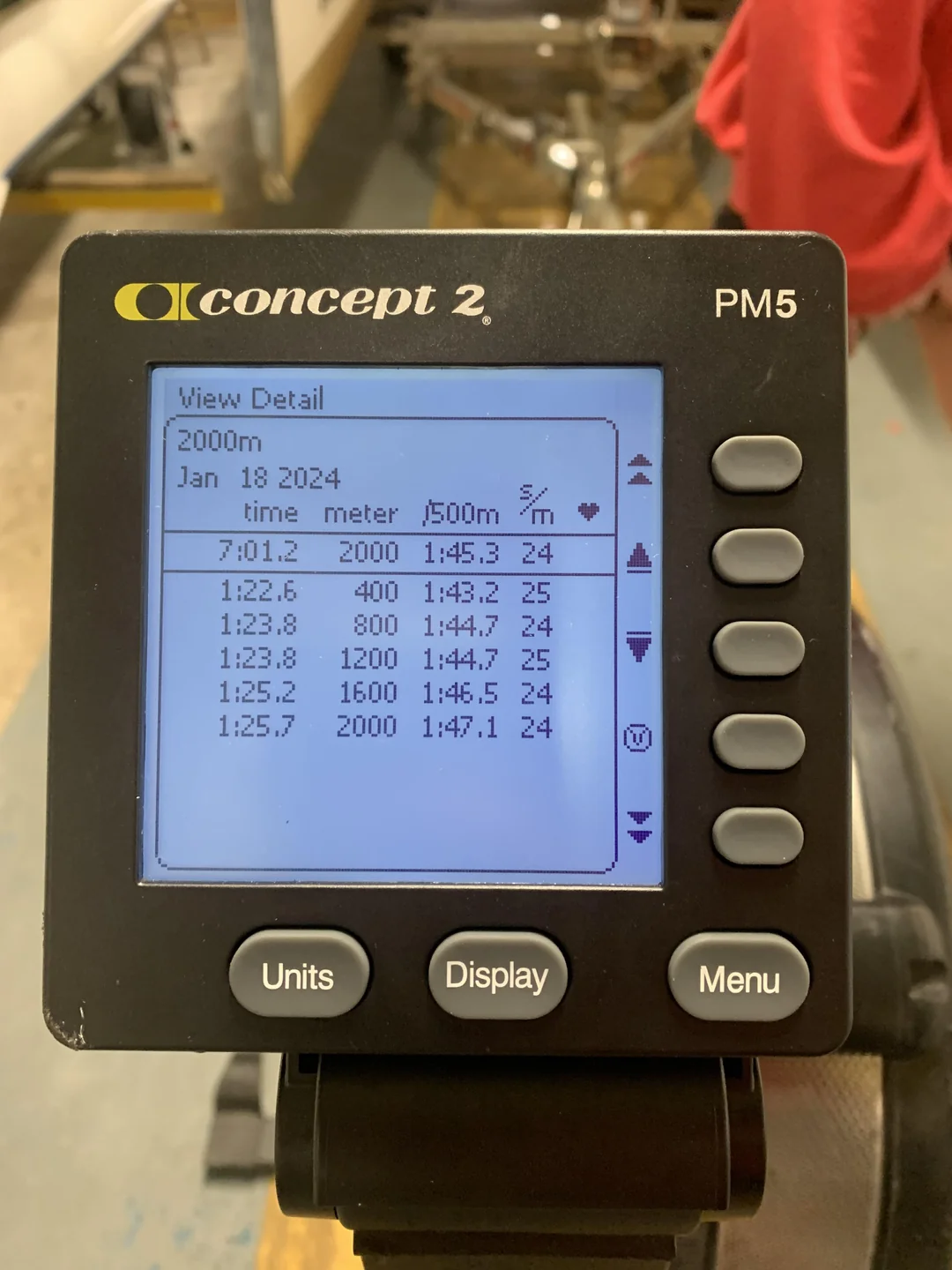As an Amazon Associate, I earn from qualifying purchases
To improve row times for 2K and 5K, incorporate interval training and focus on technique. For athletes and fitness enthusiasts alike, rowing is an excellent low-impact workout that targets multiple muscle groups.
Longer distances, such as 2K and 5K, can be challenging to improve. You can boost your performance on the rowing machine with some simple strategies and a bit of dedication.
We will explore how interval training, technique, and mental preparation can help you improve your row times and enhance your overall fitness. So, let’s dive in and discover how to take your rowing game to the next level.

The Importance Of Rowing Times
You can significantly improve your overall fitness and performance by enhancing your rowing times for 2K and 5K distances. Setting benchmarks and understanding the impact of rowing times on your progress is crucial for achieving your goals.
Setting Benchmarks
Establishing clear benchmarks for rowing times is essential for tracking progress and setting achievable goals. You can motivate yourself to push harder and improve your performance by regularly monitoring and adjusting your targets.
Impact On Performance
Rowing times directly impact performance outcomes, including speed, endurance, and fitness. By consistently striving to reduce your time, you can build strength and stamina, leading to enhanced results in your rowing endeavors.

Understanding 2k And 5k Rowing Distances
Difference In Demands
When rowing, understanding the difference in demands between a 2K and a 5K distance is crucial. The 2K row is a high-intensity, short-distance effort that requires explosive power and anaerobic capacity. In contrast, the 5K row is a longer, endurance-based challenge that demands sustained aerobic capacity and mental fortitude.
Training Considerations
Training for these two distances requires different approaches. For a 2K row, focus on high-intensity interval training, power development, and building anaerobic capacity. On the other hand, preparing for a 5K row involves developing aerobic endurance, mental toughness, and pacing strategies. Understanding the specific demands of each distance is essential for designing an effective training program.
Effective Training Strategies
Effective training strategies are crucial to improving rowing times for 2K and 5K races. Athletes can enhance their performance and achieve better results by incorporating a well-rounded training regimen. The following training strategies can assist in achieving optimal rowing times.
Interval Training
Interval training involves alternating between high-intensity bursts of effort and periods of lower-intensity recovery. This method is highly effective in building endurance and improving row times. By incorporating short, intense intervals with brief recovery periods, athletes can push their limits and enhance their cardiovascular capacity.
Strength And Conditioning
Strength and conditioning exercises are essential for rowers to develop power, stability, and muscular endurance. The following training strategies can assist in achieving optimal rowing times. A well-rounded conditioning program can enhance overall fitness and resilience during races.
Optimizing Technique
Body Positioning
Align your shoulders, hips, and feet in a straight line.
Stroke Efficiency
Focus on a smooth and consistent stroke rhythm for optimal efficiency.
Nutritional Support For Improved Performance
It’s possible to improve your 2K and 5K rowing times with nutrition. By focusing on pre-workout nutrition and post-workout recovery, rowers can optimize their energy levels and support muscle recovery, leading to improved rowing performance.
Pre-workout Nutrition
For maximum performance, fuel the body with the right nutrients before rowing. Carbohydrates are the primary source of energy for endurance activities like rowing. Consuming complex carbohydrates such as whole grains, fruits, and vegetables a few hours before a workout provides a sustained release of energy. Additionally, lean proteins aid muscle repair and growth, while healthy fats contribute to long-lasting energy. It’s important to stay hydrated by consuming adequate water and electrolytes to maintain optimal performance during the workout.
Post-workout Recovery
After rowing, your body needs essential nutrients to recover and repair. Protein is crucial for muscle recovery and should be consumed within 30 minutes to an hour after the workout. Protein shakes, lean meat, and plant-based protein shakes can all be made with plant-based proteins such as tofu and legumes. Carbohydrates are also important post-workout to replenish glycogen stores and aid muscle recovery. Including a mix of complex and simple carbohydrates with protein can optimize recovery. Electrolytes and hydration are essential for replenishing what was lost during the workout, promoting faster recovery, and preventing fatigue.

Rest And Recovery
Rest days are crucial for muscle repair and growth after intense rowing sessions.
Adequate rest helps prevent burnout and overtraining.
Injury Prevention
Proper rest is essential for preventing injuries and sustaining long-term rowing performance.
Ignoring rest can lead to muscle strains and fatigue.
Mental Preparation And Focus
Effective training strategies are crucial to improving rowing times for 2K and 5K races. Developing a strong mindset, setting clear goals, and practicing visualization techniques can help athletes enhance their mental toughness and concentration, leading to improved performance on the rowing machine.
Visualization Techniques
Visualizing success before a race can help improve performance.
Mental Toughness Training
Training the mind is essential for endurance and focus during rowing.
Preparing mentally is crucial for improving row times in 2K and 5K races.
Visualization Techniques
- Picture yourself crossing the finish line first.
- Visualize each stroke as being powerful and efficient.
- Imagine the feeling of accomplishment after a successful race.
Mental Toughness Training
- Practice deep breathing exercises to stay calm under pressure.
- Develop a positive mindset to overcome challenges during the race.
- Set realistic goals and focus on achieving them step by step.
Tracking Progress And Adjusting Goals
Tracking progress and adjusting goals are essential for continuous improvement when improving row times for 2K and 5K distances. Utilizing technology, adapting training plans, and setting achievable milestones are vital components of this process.
Using Technology
Technology plays a crucial role in tracking rowing performance. Utilize fitness tracking apps or rowing machines with built-in performance monitors to record and analyze your rowing times. These tools provide valuable data on your speed, stroke rate, and overall performance, helping you identify areas for improvement and track your progress over time.
Adapting Training Plans
Adapting your training plans based on progress is crucial for enhancing rowing performance. Adjust your training intensity and volume based on the data collected from your technology tools. Incorporate interval training, strength exercises, and endurance workouts to target specific areas that need improvement. Additionally, consider consulting with a coach or experienced rower to customize your training plan for optimal results.
Overcoming Plateaus
Learn effective strategies to break through performance plateaus and enhance rowing times for 2K and 5K distances. Rowing speed and endurance can be improved with interval training, technique refinement, and strength training.
Identifying Plateau Factors
Identifying the reasons for a performance plateau is the first step to overcome it. When an athlete’s performance plateaus, despite their best efforts, they are unable to improve their row times. There could be several reasons behind this, such as poor technique, lack of training variety, inadequate rest and recovery, or mental fatigue. It’s essential to identify the factors that contribute to a plateau and address them systematically.
Strategies For Breakthroughs
Breaking through a plateau requires addressing all the factors that may hinder performance. Here are some strategies that can help athletes overcome their plateau and improve their row times:
- Improve Technique: Fine-tuning technique can have a significant impact on rowing performance. A coach or a more experienced rower can help identify areas that require improvement and provide guidance on technique.
- Introduce Variety: Incorporating different types of training into the routine can help prevent boredom and keep the body challenged. For example, adding interval training, hill sprints, or cross-training can help break through a plateau.
- Rest and Recovery: Taking adequate rest and recovery time is crucial for performance improvement. Overtraining can lead to fatigue and injury, hindering progress. Adequate sleep, hydration, and nutrition are also essential for recovery.
- Mental Training: Mental fatigue can be a significant factor behind a performance plateau. Incorporating mental training techniques such as visualization, positive self-talk, and goal setting can help overcome mental barriers and improve performance.
- Track Progress: Keeping track of progress can help identify areas that require improvement and provide motivation. Recording row times, heart rate, and training volume can help monitor progress and make adjustments as needed.
Overcoming a performance plateau requires patience, persistence, and a systematic approach. Athletes can break through a plateau and achieve new levels of performance by identifying the contributing factors and incorporating strategies to address them.
Staying Motivated And Consistent
Rowing is an excellent full-body workout that can improve cardiovascular health, increase endurance, and help you build muscle. Stay motivated and consistent if you want to improve your 2K and 5K rowing times. Here are some tips to help you stay on track:
Setting Milestones
Setting milestones is a great way to track your progress and stay motivated. Start by setting realistic goals for yourself, such as improving your row time by a certain number of seconds or rowing a certain distance in a specific amount of time. Celebrate your accomplishments with healthy snacks or a day off.
Support Systems
The right support system can make all the difference when staying motivated and consistent. Whether it’s a friend who enjoys rowing or a coach who can provide guidance and encouragement, having someone to hold you accountable and cheer you on can help you stay on track. You can also join a rowing club or community to connect with other rowers and get inspired by their progress.
Consistency Is Key
Consistency is essential when it comes to improving your row times. Try to stick to a consistent rowing schedule and make rowing a part of your daily routine. Whether you prefer to row in the morning before work or in the evening after dinner, find a time that works best for you and make it a habit. You don’t need to be too hard on yourself if you miss a day or have a setback – just get back on track and keep going.
Frequently Asked Questions
How Can I Improve My 2k Rowing Time?
To improve your 2K rowing time, focus on technique, build strength with weight training, incorporate interval training, and stay consistent with your workouts.
How To Improve 5k Rowing Time?
Increase your strength and endurance through regular training to improve your 5k rowing time. Incorporate interval training, strength exercises, and proper technique to improve your performance. Additionally, maintain a balanced diet and get enough rest for optimal results.
How Can I Improve My Rowing Time?
To improve your rowing time, focus on building strength, increasing endurance, and perfecting technique through consistent practice. Incorporate interval training, proper nutrition, and rest for optimal performance.
Conclusion
Improving row times for 2K and 5K requires dedication and consistency. Focus on technique, endurance, and mental strength to make significant progress. Keep track of your progress, set realistic goals, and stay motivated during your training
With determination, you can achieve your rowing goals successfully.
As an Amazon Associate, I earn from qualifying purchases

